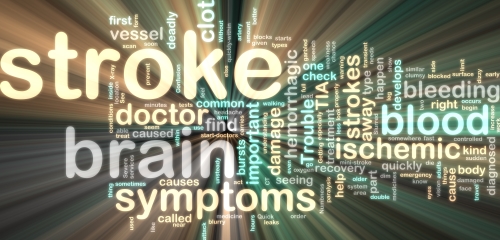Signs and Symptoms of a Stroke
Ischemic vs. Hemorrhagic Strokes
A stroke can be devastating-and can happen quickly, to people of any age. Brain cells need oxygen to survive; when blood flow to a specific area of the brain is blocked off, the cells become oxygen-starved and can start to die within minutes.
As the cells die, many functions of the body can be affected-including muscle control, speech, and memory. A minor stroke can cause small effects, such as temporary weakness in a leg, arm, or other area of the body; a large stroke can cause permanent paralysis in specific areas of the body, or serious problems with brain function. The type of long-term effects you see after a stroke depend on which parts of the brain were affected.
How well you survive a stroke depends on a variety of factors as well-including how large the stroke was and how quickly you receive medical help.
Getting help quickly is key to recovery; the more time brain cells go without oxygen, the more of them die, causing more extensive damage.
Ischemic vs. Hemorrhagic Strokes
Hemorrhagic strokes are caused when a blood vessel bursts, spilling blood into the brain. This creates swelling in the skull. Hemorrhagic strokes are the most dangerous kind; although only 15% of strokes in the United States fall under this category, they cause 40% of all stroke fatalities. Older adults are more at risk of this type of stroke, as blood vessels can weaken with age.Ischemic strokes are caused by a block in the blood vessel. The block can be a blood clot; some medications make blood clots more likely to form. It can also be a fatty deposit that has built up in the blood vessel wall, a condition called atherosclerosis. This condition is usually caused by high cholesterol levels in the blood. These are the more common types of strokes, accounting for approximately 85% of cases. Regardless of the cause of a stroke, symptoms are largely the same.
Signs and Symptoms of a Stroke
Sudden clumsiness. A stroke can cause a sudden onset of dizziness, loss of coordination, or problems with balance. If you are walking along normally and suddenly experience these symptoms, it could be a sign of a stroke.
Slurred words or trouble understanding speech. A stroke can also affect the part of the brain that controls speech, or facial muscles associated with it. If you are suddenly slurring your words or having trouble understanding people around you, it could be because of a stroke.
Paralysis or numbness in an area of the body. Depending on where the stroke occurred, you could experience sudden numbness in the face, arms, legs, or elsewhere. You could also experience numbness in the affected area. Often, this symptom is only felt on one side of the body.
Vision problems. Some stroke victims report having problems seeing with one or both eyes. Blurred vision is also a common symptom.
An excruciating headache. If you are experiencing a very painful headache, you could be undergoing a stroke. It's possible to only experience this symptom at first, although headaches can be caused by many other things as well. Stroke headaches are often particularly severe, however, and could be accompanied by nausea and vomiting, dizziness, vision problems, or other symptoms.
Every second counts if you're having a stroke. If you suspect you may be, call 911 immediately. The sooner you get medical attention, the less likely the stroke will cause lasting damage.
Related Articles:
Home | About | Articles | Resources | Site Map | Privacy Policy
Elder Options of Texas
Copyright 2001-2024
All Rights Reserved
DISCLAIMER: Links to other websites or references to products, services or publications do not imply the endorsement or approval of such websites, products, services or publications by Elder Options of Texas. The determination of the need for senior care services and the choice of a facility is an extremely important decision. Please make your own independent investigation.



